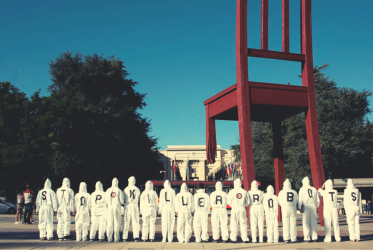Letter to the five permanent members of the UN Security Council, and the UN Ambassadorsof North Korea and its neighbours, South Korea and Japan, 9 October, 2006
Your Excellencies,
We address this letter to the states most directly required to respond to the
North Korean government's apparent test of a nuclear device today. We pray that
God will help you to respond wisely, peacefully, lawfully and collectively. News
of the test is frightening evidence of the permissive erosion of nuclear weapons'
control, which has been taking place under the collective purview of the international
community and its leading member states for the past several years.
We bring international and regional implications to your attention.
A nuclear test by a new state in 2006 is not only a new regional threat to world
security. It is also a dangerous consequence of the failure to meet international
political obligations and commitments, especially among those governments who
have taken up nuclear arms, openly or otherwise.
When member churches from 150 countries met in the World Council of
Churches' Ninth Assembly this year, they noted the "unequivocal undertaking"
made in 2000 by signatory states of the Nuclear Non-Proliferation Treaty to meet
their obligations and eliminate all nuclear weapons. They noted further, however,
that the bargain at the heart of the NPT is broken and that, instead of progress
in this field, there is crisis. Recalling six decades of church concern for the elimination
of nuclear arms, they urged governments to return to and reinvigorate
the NPT.
Preventing conflict, increasing security and safeguarding human life are among
the most basic responsibilities of all governments including yours. Nuclear arms
control and disarmament contributes uniquely to all three. Progress is eminently
possible in a climate of respect for the international rule of law.
Fulfilling your government's obligations under the NPT, and, for those outside
the treaty, joining the treaty as Non-Nuclear-Weapons States, are effective means of
conflict prevention and security enhancement. Verified disarmament and verified
non-proliferation are paramount measures for rebuilding that confidence in an international
system that has been dissipated during the first six years of this century.
In the East Asia region, today's event puts new urgency into a successful outcome
from the Six Party Talks. North Korean nuclear testing must not be allowed
to cause a chain reaction involving Japan, Taiwan, South Korea and possibly others
such as Indonesia and Australia. We recall that the six-party talks begun in
August 2003 in Beijing led to an agreement to work towards a nuclear-free Korean
Peninsula and provided real signs of hope. In that light the WCC Executive
Committee, meeting in Seoul in August 2004, called for the talks to lead to a
formal peace treaty in the Korean Peninsula, urged the government of the DPRK
to abandon its nuclear weapons programme and make a verified return to the
NPT as a non-nuclear-weapons state, and urged participants in the six-party talks
to give due consideration to the DPRK's concern for its security in order to resolve
the crisis. The same conditions still obtain today.
We call on each of your governments to ensure that the nuclear weapons crisis
in north-east Asia is resolved politically through the negotiated settlement of
grievances among the parties concerned and that it is resolved legally by a determined
and general movement of states into the spirit and the letter of the NPT
and related treaties under the auspices of the United Nations.
Yours sincerely,
Rev. Dr Samuel Kobia
General Secretary


